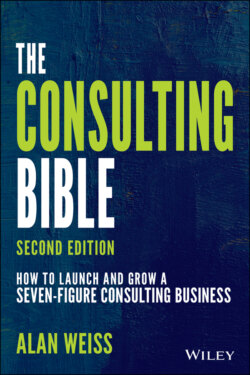Читать книгу The Consulting Bible - Alan Weiss - Страница 11
The Ongoing Need
ОглавлениеWe've established that our role is to improve the client's condition. That client is the person who is authorizing our payment out of his or her budget. I call that person the economic buyer. The buyer is our client, not the organization. A client is a human being, not an inanimate entity.
I know you prefer to list Bank of America or Microsoft as your client, and we all do such things. But very few buyers have the authority to hire you on behalf of the entire organization, and even those that do—CEOs, board chairs—are almost always hiring us for a limited scope of action. Your allegiance is to the economic buyer, the person whose condition is to be improved. (Only if you find that the buyer in ethical or legal conflict with the organization should you abrogate that allegiance.)
“Need” for the buyer comes in three flavors:
1 Preexisting needs.These are age‐old, traditional, and valid needs now and tomorrow, and may include such areas as customer relations, market expansion, strategy, conflict resolution, innovation, and so on. Even the pharaohs had team‐building needs, but they chose to take care of them with whip methodology.
2 Needs you create.All clients know what they want, but few know what they need. No one knew they needed a belt‐mounted device connected to headphones to play music, but Akio Morita at Sony created the need with the Walkman (despite internal advice not to pursue it because no one wanted it). That was the grandfather of the iPhone, which is one of the most popular consumer products in history. Today we have tele‐health and 3‐D printing. Don't forget, a luxury, once used successfully, quickly becomes a necessity! The COVID pandemic created the need for remote meetings, work‐at‐home protocols, workplace safety parameters, and so forth.
3 Needs you anticipate.Globalization, increased volatility, changing societal mores, technological advances, and other waves of change should enable any consultant to predict future needs for the client, such as the need to manage remote teams that never see each other, to outsource some services while insourcing others, and to create new levels of internal computer security. Disruption and volatility are offensive weapons not threats to be defended against.
